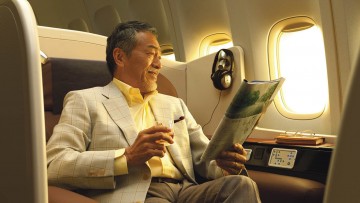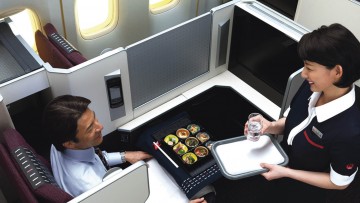With increasingly sophisticated use of analytics to personalise travel experience, it is reasonable to imagine that airlines will focus on expanding their repertoire of product and service offerings to customise value propositions, and make them more relevant and compelling.
After all, it makes little sense knowing what a customer wants, but not having the capability to serve that need. This, however, poses a challenge to airlines as they attempt to unbundle and rebundle their capabilities, often by utilising external resources that suppliers and partners provide.
New and innovative value offerings by airlines could stretch beyond conventional air travel products to include non-air-related ancillary goods and services.
With more options to choose from, consumers too face a new challenge of finding the right product, and making value comparisons across a wide array of different brands, products and channels.
 A proliferation of alternatives and options could prompt information aggregators to reduce customer-search cost by using data to identify the right product for the right customer based on his or her search criteria and preference profile. This in turn could drive travellers into becoming more and more airline brand agnostic in their purchasing process.
A proliferation of alternatives and options could prompt information aggregators to reduce customer-search cost by using data to identify the right product for the right customer based on his or her search criteria and preference profile. This in turn could drive travellers into becoming more and more airline brand agnostic in their purchasing process.
Although airlines will continue to personalise and customise products and services, the time and cost needed to produce different variations to suit different needs may become prohibitively expensive and unaffordable.
As product life cycles become shorter, many novel ideas and products quickly become imitable by other airlines too. Yet, at least for full-service airlines, it seems there is little choice but to invest to stay ahead. This challenge brings me to think of the less imitable side of airline competencies and in particular human service.
It is important for airlines to understand customer needs not just in terms of air transport from point A to point B, but to zoom out of the air travel experience and endeavour to understand the wider value in context.
To a business traveller, for example, air travel is just a part of his or her value creation activity, which could be something like closing a multi-billion-dollar contract with an investment partner abroad. How an airline fits into the business traveller’s value creation activity depends on that person’s needs and it often goes beyond just the trip.
If I am to name just one thing that is quintessentially Japan Airlines, that would be the just-for-you omotenashi, Japanese-style hospitality service
Although this may sound very straightforward, people often fail to see that all value propositions are perceived and integrated differently by each unique individual. To a traveller, the value of the air transport service provided by his or her airline of choice is hence uniquely experienced and determined. Perhaps all the unique context of all individuals can be summed up with the word “tomorrow” and it is precisely this every person’s tomorrow that Japan Airlines strives to be a part of.
However, this elicits the question of how realistic is the idea of personalising service on a one-to-one basis to all customers on a flight? There is no definite answer to this question as different airlines have different approaches.
In Japan Airlines, we deliver a truly top-class in-flight experience through a combination of competencies from luxurious cabin interior to exquisite cuisine, hospitable cabin attendants, best on-time performance and high safety standards.
But, if I am to name just one thing that is quintessentially Japan Airlines, that would be the just-for-you omotenashi, Japanese-style hospitality service.
Just as no contracts can ever be complete, manuals too cannot prescribe all contingencies. This is why in Japan Airlines cabin crew training, in addition to our regular curriculum for developing skillsets and service mindsets, a heavy emphasis is placed on developing empathetic intelligence, in other words the capability to detect customer needs and to engage accordingly.
It is through this awareness that our cabin crew are able to identify opportunities to be more responsive to individual needs and to deliver the Japan Airlines experience effectively. Earlier, I used the word “quintessentially” because this is indeed the premium omotenashi that can be experienced in all Japan Airlines flights regardless of whether you are flying in first class, business class or economy class.
PERSONAL SERVICE AND KINDNESS
 When a Japan Airlines domestic flight from Tokyo to Yamagata was cancelled, Hanako – I’m using a pseudonym for her – an off-duty cabin crew member, who originally planned to board the flight, noticed an elderly lady near the check-in counter who appeared to be troubled. Hanako approached the lady and inquired whether she could help. The elderly lady replied that she wanted to go to Yamagata by shinkansen express bullet train, but did not know the way to Tokyo station. Hanako said to the lady that she was on her way to Yamagata too and suggested they go together. Hanako then went with the lady to Tokyo station and together they boarded a shinkansen to Yamagata. Later, the elderly lady’s family wrote to Japan Airlines to thank Hanako for her kindness. This episode illustrates the just-for-you omotenashi spirit in Japan Airlines. It is more than just noticing a need – it is about responding actively.
When a Japan Airlines domestic flight from Tokyo to Yamagata was cancelled, Hanako – I’m using a pseudonym for her – an off-duty cabin crew member, who originally planned to board the flight, noticed an elderly lady near the check-in counter who appeared to be troubled. Hanako approached the lady and inquired whether she could help. The elderly lady replied that she wanted to go to Yamagata by shinkansen express bullet train, but did not know the way to Tokyo station. Hanako said to the lady that she was on her way to Yamagata too and suggested they go together. Hanako then went with the lady to Tokyo station and together they boarded a shinkansen to Yamagata. Later, the elderly lady’s family wrote to Japan Airlines to thank Hanako for her kindness. This episode illustrates the just-for-you omotenashi spirit in Japan Airlines. It is more than just noticing a need – it is about responding actively.
With increasingly sophisticated use of analytics to personalise travel experience, it is reasonable to imagine that airlines will focus on expanding their repertoire of product and service offerings to customise value propositions, and make them more relevant and compelling.
After all, it makes little sense knowing what a customer wants, but not having the capability to serve that need. This, however, poses a challenge to airlines as they attempt to unbundle and rebundle their capabilities, often by utilising external resources that suppliers and partners provide.
New and innovative value offerings by airlines could stretch beyond conventional air travel products to include non-air-related ancillary goods and services.
With more options to choose from, consumers too face a new challenge of finding the right product, and making value comparisons across a wide array of different brands, products and channels.
